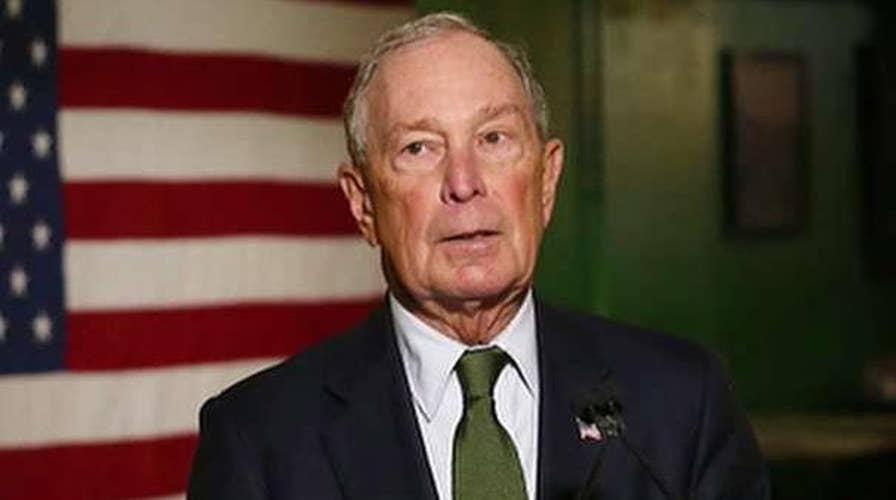Bloomberg on 2020 Democrats: Trump would eat them up
Bloomberg takes swipe at fellow Democratic candidates; Republican political strategist Ashlee Strong and Democratic strategist Kevin Chavous react.
Former New York City Mayor Mike Bloomberg has spent $100 million of his own money on an unprecedented coast-to-coast ad blitz since launching his Democratic presidential campaign late last month.
But a new poll indicates the eye-popping figure – per ad-buy tracker Advertising Analytics – isn’t paying off immediately for the billionaire businessman and media mogul.
BOOKER TAKEN ABACK AFTER BLOOMBERG CALLS HIM 'VERY WELL SPOKEN'
Bloomberg stands with a 40 percent favorable and 39 percent unfavorable rating among Democrats and Democratic-leaning voters in a Monmouth University national poll released Tuesday. His 1 percentage point net favorability pales in comparison to his top rivals for the 2020 Democratic nomination.
Sen. Elizabeth Warren of Massachusetts stands at 76-15 percent favorable-unfavorable in the poll, for a net positive 61 points. By that same measurement, former Vice President Joe Biden is at a 56-point net favorability, Vermont Sen. Bernie Sanders is at 53 points, and South Bend, Indiana Mayor Pete Buttigieg is at 35 points.
And Bloomberg's rating is well underwater among crucial independents, and registered voters as a whole. His popularity is lower than President Trump's; while the president has a favorable rating of 46 percent among registered voters, Bloomberg's is just 26 percent.
“Bloomberg said he got into this race because he wants to defeat Trump, but his campaign kicks off with even lower ratings than the incumbent. That is not the most auspicious start, but views of Bloomberg are not as deeply held as they are for Trump, so he has room to shift those opinions,” Patrick Murray, director of the Monmouth University Polling Institute, said in a statement.
Bloomberg flirted with a White House bid at the beginning of the year -- but with Biden gearing up for a presidential bid, he decided against launching a campaign at the time because he felt he and the former vice president would split the center-left Democratic vote. But with Biden, once the unrivaled front-runner, now battling other top-tier contenders, Bloomberg jumped into the race on Nov. 24.
BLOOMBERG ON HIS 2020 RIVALS: 'TRUMP WOULD JUST EAT THEM UP'
Explaining in an interview with CBS "This Morning" last week why he launched a White House bid with just two months to go until the start of the primary and caucus nominating calendar, Bloomberg said: “I watched all the candidates and I thought to myself, 'Donald Trump would just eat them up'.”
Bloomberg is skipping the early voting states of Iowa, New Hampshire, Nevada and South Carolina – which kick off the presidential nominating calendar in February. Instead, he’s concentrating on the delegate-rich states that hold contests in March, and beyond.
Biden stands at 26 percent support nationally in the race for the nomination, according to the new poll, with Sanders at 21 percent and Warren at 17 percent. Buttigieg is at 8 percent support, with Bloomberg at 5 percent, Sen. Amy Klobuchar of Minnesota at 4 percent, tech entrepreneur Andrew Yang at 3 percent, and Sen. Cory Booker of New Jersey at 2 percent. Seven other candidates stood at 1 percent or less.
The poll didn’t help Yang qualify for next week’s sixth round Democratic presidential primary debate. Yang remains one poll shy of reaching the thresholds to make the stage at the Dec. 19 showdown.
Candidates must reach at least 4 percent in four surveys recognized as qualifying polls by the Democratic National Committee, or 6 percent in two polls in the early voting states of Iowa, New Hampshire, Nevada and South Carolina.
THE LATEST FROM FOX NEWS ON THE 2020 PRESIDENTIAL CAMPAIGN
Yang has already reached the other qualifying criteria – individual contributions from at least 200,000 individual donors.
Rep. Tulsi Gabbard of Hawaii also remains one poll shy of qualifying for the debate – but she stood at less than 1 percent in the poll. On Monday, Gabbard announced that she wouldn’t attend the debate even if she qualifies. The candidate said instead, she’ll meet with voters in New Hampshire and South Carolina.
The Monmouth University Poll was conducted Dec. 4-8, with 903 adults nationwide questioned by live telephone operators. The sample included 384 voters who identified as Democrats or lean toward the Democratic Party. The margin of error for questions of those voters is 5 percentage points.





